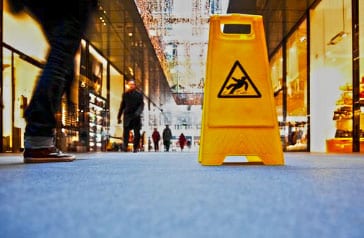
Liability for Mall Accidents and Injuries
State and federal laws require mall and shopping center owners to protect visitors on their property from harm. This makes property owners liable for foreseeable accidents and injuries. Mall owners are not held liable for every injury that occurs on the premises, however.
Foreseeable accidents are often caused by negligence on the part of the mall owner or mall employees. Common foreseeable events include wet or slippery floors; poor lighting in stairwells; damaged or loose handrails; escalator or elevator malfunctions; faulty sprinklers; and unprotected construction areas.
Mall owners are required to keep their premises reasonably safe. Failure to regularly inspect and maintain escalators or replace damaged handrails constitutes negligence. If accidents and injuries occur from owner negligence, the mall owner is liable. On the other hand, if a mall visitor drops a shopping bag on the floor which causes a slip and fall accident, the injury victim must seek compensation from the careless individual through a personal injury lawyer.
A recent accident at Orland Square Mall in Illinois killed a two-year-old girl. The toddler was climbing on a display inside a mall clothing store when two temporary wall dividers fell on her. The 8-foot high dividers were made of steel, so the girl was crushed underneath them when they fell. The girl was rushed to a nearby hospital but died of severe head injuries. The accident is still under investigation, but officials blame the lack of adult supervision as a major cause.
How Do You Prove Negligence and Liability?
Although laws require malls and shopping centers to provide a safe environment for visitors, personal injury claims for negligence must be proven with evidence. An injury victim must show:
- A dangerous property condition existed
- The dangerous condition directly caused the injury
- Mall management knew, or should have known, of the dangerous condition
- Mall management failed to remove or repair the dangerous condition
- Medical documentation and related expenses for injuries
Mall visitors do not have to be paying customers to receive protection in a safe environment. Under duty of care laws, anyone visiting the mall has a legal right to protection from undue harm by the mall owner.









